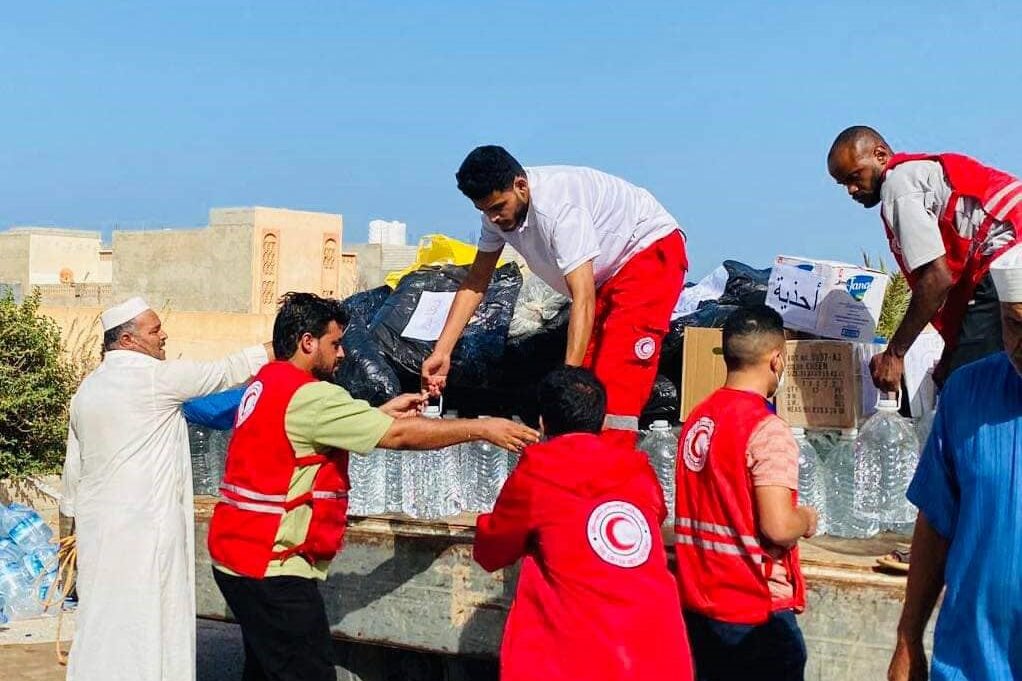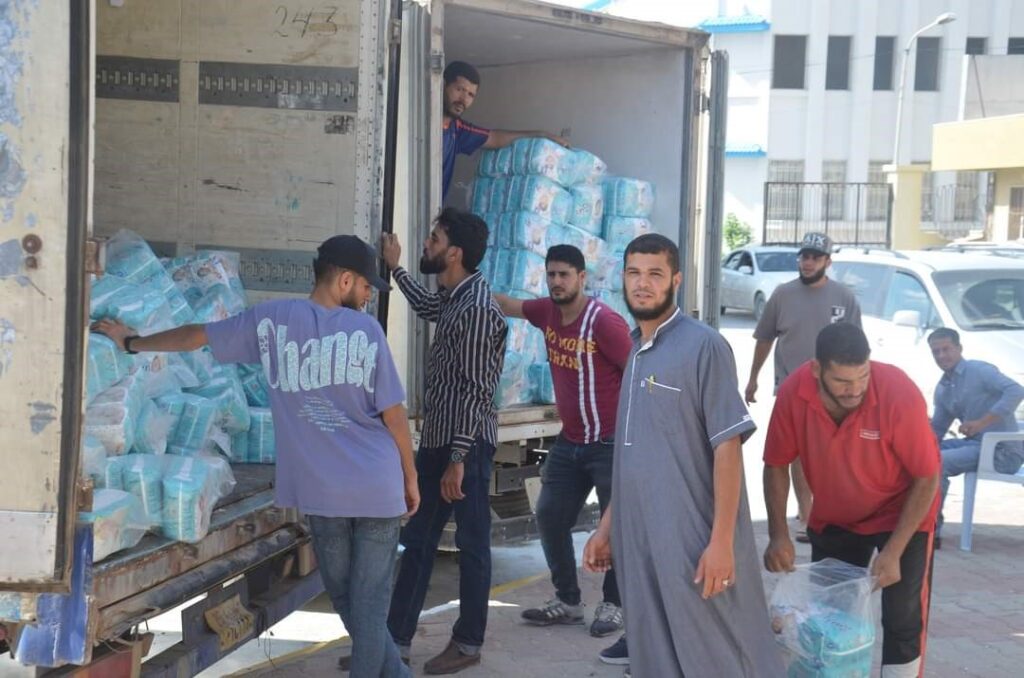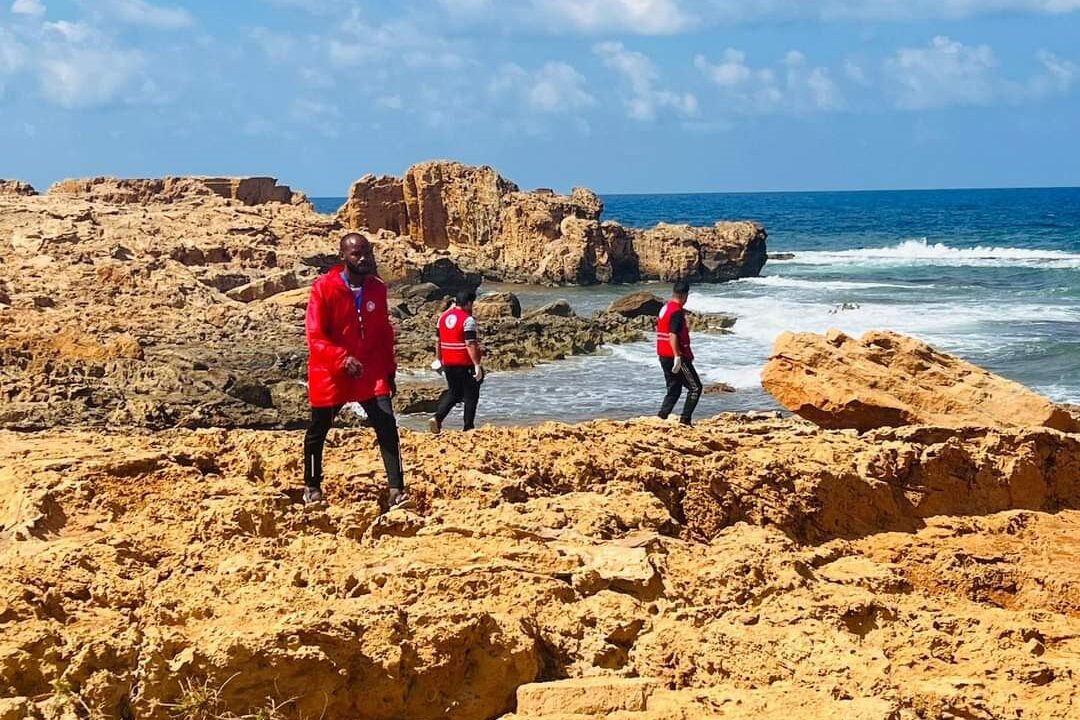In the aftermath of Storm Daniel, Social Peace Partnerships across Libya quickly mobilised to respond to the unprecedented emergency in eastern Libya.

As the world grapples with the impact of the climate breakdown, countries with weak infrastructure, failed governance and limited climate change preparedness such as Libya are particularly vulnerable to its consequences. On September 10 2023, Storm Daniel – a rare tropical Mediterranean storm – hit eastern Libya. Cities across the region witnessed torrential rain and high-speed winds. Due to poor drainage and water management systems, heavy flooding led to substantial damage of infrastructure, particularly the destruction of the poorly maintained dams and irrigation systems.
The city of Derna bore the brunt of the damage and experienced the most disastrous consequences when two dams collapsed, causing devastating flooding downstream and wiping out entire neighbourhoods. At the time of writing this article, about 5,000 people were confirmed to have died, while around 10,000 were still missing and about 30,000 were displaced.
While the response from both governments was slow, Libyan citizens and civil society organisations across the country immediately mobilised to provide emergency support and aid to communities in the affected areas. The eastern Regional Hub and many Social Peace Partnerships (SPPs) across the country responded promptly by collecting donations, sending aid, coordinating psychosocial support initiatives, resettling internally displaced persons (IDPs) within host communities, and reconnecting orphaned children with their extended families. This tragedy was deeply felt by Libyans as a moment of national unity and the spontaneous response from civil society and ordinary citizens provided a positive narrative of solidarity and reconciliation.

Social Peace Partnerships quickly responded to eastern Libya’s Storm Daniel emergency
The Derna SPP, located at the epicentre of the disaster, was one of the first SPPs to respond by contributing to efforts to recover bodies of victims, and facilitating access to areas that were inaccessible by clearing roads and access points. The SPP has also been working voluntarily with security forces and local organisations outside the city to coordinate access and facilitate the distribution of aid into Derna to those communities that are most vulnerable. This coordinated response highlights the value and utility of the SPPs, which work as crisis management and coordination mechanisms, providing support to vulnerable communities and mobilising responses in partnership with civil society organisations, relief agencies and government authorities.
The SPP in Sahel, another area impacted by the floods, also intervened in the aftermath of Storm Daniel. Abdulsalam Alsakta, a member of the Sahel SPP, recounted the challenge they faced:
The municipality of Sahel stretches across 160km with 18 local communities located along the coast, which has made the response efforts particularly difficult. There have been 50 victims in our municipality and this number will rise. 260 families in Bayda have been displaced due to the damage to their homes from the floods, and another 42 homes in Hamama were completely destroyed. From day one, the SPP created an emergency room and have been working across Al-Sahel to address emerging health issues and provide support to the displaced, but the situation is dire and our resources are limited.
The SPPs in cities surrounding Derna also rushed to help, both through the delivery of aid and through the provision of logistical support to displaced families. The initiatives delivered by SPPs across the region, which saw them mobilise their own members and networks to provide relief support to those affected by storm Daniel, highlight the ability and confidence of the SPPs to work beyond their Municipality borders and cooperate regionally with other SPPs and partners.
Strom Daniel response shows Social Peace Partnerships play a crucial role at community and regional levels
The countrywide response to the flooding due to Storm Daniel is a testament to the crucial role that Social Peace partnerships play, underlining the ability of the SPPs to overcome geographical and political divisions and resource constraints in order to help those most in need. The existing infrastructure of the SPPs, their substantial experience in crisis management, their networks and relationships with governmental and non-government institutions, and their ongoing efforts to create partnerships regionally and nationally have contributed to a lifesaving, coordinated response.
From the interventions implemented by the SPPs, it is important to highlight that the SPPs mobilised support independently of Peaceful Change initiative, which is a testament to their growing confidence and autonomy as critical peacebuilding, crisis management and governance support structures that can sustain and resource their work with limited international input, delivering initiatives that have made tangible contributions to relief efforts.

Integrating climate security analysis into Social Peace Partnership initiatives
In Libya, the impact of climate change is heightened by the absence of a unified government and by fragile state institutions, which translate into a lack of accountability to implement climate adaptation measures; climate pressures also act as an accelerator of conflict, fuelling community tensions and more competition over natural resources. For this reason, we are working to integrate climate security analysis into our programming, with a particular focus on how climate security interacts with gender, peace and conflict dynamics.
We are exploring how SPPs can better integrate climate security analysis into the design of their social peace initiatives across Libya. We believe SPPs can play an instrumental role in sensitising local communities on the risks and threats of climate change, and want to support them to advocate for improving climate change preparedness, including by championing a greater role for women, young people, and marginalised communities in decision making on resource management and climate adaptation.
